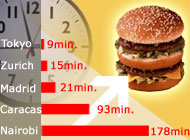Purchasing power around the globe explained with a hamburger

A new report on prices and earnings around the globe confirms that Switzerland is expensive and affluent, with purchasing power high by international standards.
The two Swiss cities in the survey, Zurich and Geneva, are in the top group as far as prices and earnings are concerned. In terms of purchasing power, they head the list, together with Luxembourg and the major United States cities.
The study uses the humble hamburger to illustrate the point.
According to the survey, it takes 15 minutes of working time to buy a hamburger in Zurich and 16 minutes in Geneva.
One of the authors of the report, economist Oyvin Furustol told swissinfo it was not just Zurich and Geneva that were towards the top but Switzerland as a whole.
“It’s got less to do with the cities we’ve picked out for our study than the fact that in Switzerland we have very high productivity because of very high human capital,” he said.
“On the other hand, we have relatively high prices compared to our European neighbours, mainly because of lower competition in non-tradable goods,” he added.
Economists at the UBS financial group recorded and analysed more than 25,000 data items relating to prices of goods and services, as well as wages, deductions and working hours.
Their findings are in “Prices and Earnings around the Globe”, the UBS report on living costs and purchasing power in 58 cities all over the world, which is now in its 11th edition.
Tokyo is by far the most expensive city in the study, with Oslo, New York, Chicago, Zurich and Stockholm following some way behind.
The Japanese capital is no longer just the most expensive city in the UBS comparison for goods and services. It also tops the league table for wages, clearly ahead of major Swiss and US cities.
The study makes the point that the size of a person’s income alone does not say much about what that person can afford. Only the relationship between income and a representative shopping basket helps give the real picture of purchasing power.
According to the economists’ findings, purchasing power based on gross income is highest in Geneva, followed by Brussels, Montreal, Luxembourg and Zurich. At the other end of the scale come Nairobi, Jakarta, Moscow and Shanghai.
However, the study says that a comparison of purchasing power based on net income is more useful, since it takes account of what remains after tax and social security deductions. Luxembourg, the US and Swiss cities form the lead in this respect.
While the study is full of tables of statistical material – international price comparisons for food, apartments, clothes, hotel rooms and car prices – one chart in particular stands out.
It is the working time around the globe required to buy a Big Mac hamburger.
As the authors of the report see it, differences in purchasing power are particularly clear when expressed as the price of a benchmark product in terms of the average hourly net wage.
“The Big Mac is ideal for this purpose: being one of the world’s favourite foods, it can be obtained without any major variation in quality practically anywhere,” the report says.
On average, 36 minutes of work time is required to buy one around the world. But there are huge differences. The average wage earner in the US has to work only 12 minutes to afford the hamburger.
At the other end of the scale, it requires 178 minutes of work to buy one in Nairobi, 146 minutes in Jakarta and 145 in Bombay.
You can read the study or download it from the link in red below.
by Robert Brookes

In compliance with the JTI standards
More: SWI swissinfo.ch certified by the Journalism Trust Initiative
You can find an overview of ongoing debates with our journalists here . Please join us!
If you want to start a conversation about a topic raised in this article or want to report factual errors, email us at english@swissinfo.ch.